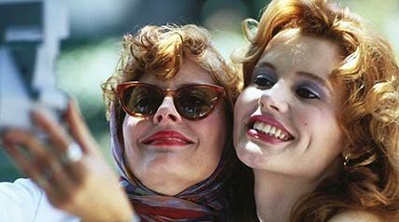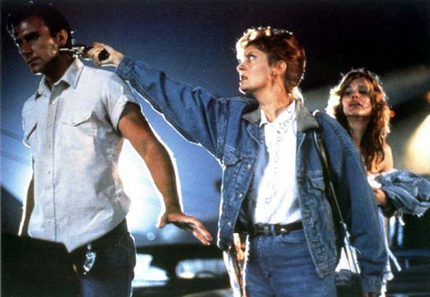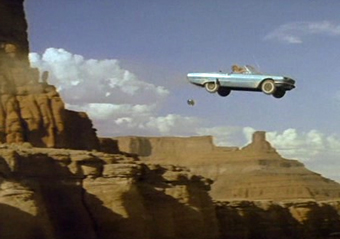
 |
|
|
|
Hollywood loves films with just the right amount of controversy, and they got it in 1991 with Ridley Scott's Thelma & Louise, a girl-girl inversion of the male buddy picture, a formula then beaten to death from over twenty years of overexposure. T&L (nobody had the guts to name the leads "Thelma and Annie") was from MGM, which the next year or so put out Harley Davidson and the Marlboro Man, the sorriest excuse ever for a male buddy picture. But MGM hit the right nerve with a script from a new female writer, Callie Khouri, fine star performances (in the classic sense) from Susan Sarandon and Geena Davis, and Ridley Scott at his pictorially pleasing finest. Scott's attractive visuals have made plenty of his films impressively watchable, as with the sometimes-interesting Blade Runner. Here he has two fun, feisty women for us to observe, along with and half a movie's worth of choice Southwestern landscapes. Neither waitress Louise (Sarandon) nor housewife Thelma (Davis) is particularly happy. Louise is stuck with a balky boyfriend and Thelma is married to a first class jerk, Darryl (Christopher McDonald). Louise suggests they unwind for a weekend at a friend's mountain cabin and Thelma says yes; Darryl is so abusive that Thelma doesn't bother to ask for permission to go. But Thelma feels so liberated on the road on the road that they stop at a country bar, where she proceeds to let a hustling goon named Harland Puckett (Timothy Carhart) get her drunk. When he tries to rape her in the parking lot, Louise intervenes with a pistol and then kills him. Terrified and disoriented, the two women run away. Louise decides to go to Mexico until the problem blows over and asks her boyfriend Jimmy (Michael Madsen) to send her money in Oklahoma City. Jimmy comes as well thinking that their relationship is in trouble, but Louise doesn't want to make him an accessory. Unfortunately, Thelma spends the night with a randy hitchiker named J.D. (Brad Pitt, in a star-making role), who steals Louise's cash. Trying to atone, Thelma robs a store. In short order the two girls are considered armed and dangerous and Arkansas detective Hal (Harvey Keitel) and the FBI are after them -- the fugitives' chances of reaching Mexico aren't very good. 
Thelma & Louise ignited a "safe" controversy when certain critics thought it wasn't proper for women to be involved in a shoot 'em up movie, that it was a betrayal of feminism, or perhaps too radically feminist. That was pretty much baloney, as the movie does with women what movies had been doing with men for decades -- making films that intersperse humor and drama with wild chases and shootouts. The movie's violence was noted, even though it wasn't all that violent, especially when compared to the stratospheric body counts in male action films of any stripe. The objections probably come from the double standard. Thelma is clearly liberated by danger and violence ("I got a knack for this shit!") and both women become new western heroines, tearing up the sagebrush in the name of femme dignity. The film is a good example of a subgenre (sordid rural crime spree) formerly considered low-grade exploitation, now being groomed as quality filmmaking: Jackson County Jail or Big Bad Mama but with Oscar-caliber talent. The movie even has a huge fireball explosion for its trailer, as if Roger Corman were in charge. The film generates some of the same audience reactions as Sam Peckinpah's The Wild Bunch: Louise's impulse murder is a "Why not?" moment, and the girls' enraptured buddy-buddy embrace of their final gesture is a definite Peckinpah "Let's Go!" moment. Their suicidal rapture makes them the patron saints of urban police chase perpetrators everywhere. If the Thelma & Louise idea had caught on we might have seen the beginning of a new subgenre, called Femmesploitation. Some male critics were not happy, a reaction to the fact that the movie wags the stereotype stick directly at men. Although Khouri and the stars deny any such notion, the movie is about difficult men, with "difficult" spelled P - I - G. Thelma's Darryl is an infantile bully and an embarrassing clown who doesn't know better than to stand on his own pizza. Jimmy is a good enough egg, but even he didn't realize what a prize Louise was until he thought she was leaving him. The rapist and other guys on the road are depressingly depraved macho examples that can be found in the wild with a frequency that depresses. But face it, both Jimmy and the 'good cop' Hal are decent guys only because they seem smart enough to feel guilty of their porcine heritage. We're told that Thelma & Louise helped popularize western line dancing. Apparently, no permanent connection was made between "line dance" and "rape in the parking lot". I think the film also marks the advent of the obsession with washboard abs. The hitchiking heartbreaker J.D. is another gender reversal, as he corresponds to the irresisible 'pretty young thing' in male fantasies. He's the personification of William Holden in Picnic, who brags that two "Hollywood Babes" in a convertible picked him up on the interstate by shouting, "Hey beefcake!" This is also the way that Tennessee Williams seems to have defined macho appeal. I personally have never had a use for Brad Pitt, but he apparently aligns with a wide swath of female fantasies, the dog. Pitt's instant popularity after this movie validates his appeal to women. Going one step further, Thelma & Louise marks the watershed year in which mainstream American films switched from presenting male sex fantasies to female sex fantasies. It's Pitt's torso and unbuttoned Levis that tease Davis, not the other way around. From now on, more women keep their tops on and more men take their pants off. In period films, it's hunks like Pitt that sport anachronistic, fashion-conscious hairstyles. Callie Khouri's snappy, often excellent girl-girl dialogue and the acting of Sarandon and Davis overcome the weak character of Thelma, who alternates between hausfrau bozo helplessness and Che Guevara True Grit. A former child bride, Thelma intially seems brainwashed into serving her insufferable hubbie. Half an hour on a road trip and she's running wild, and apparently oblivious to what a drunken goon might take as come-on behavior. It goes belong being sheltered and cooped up too long -- doesn't Thelma have a TV to watch? For the story's jeopardy to snowball, somebody has to make a lot of stupid mistakes, and Thelma is the one tapped with the Dumb Bunny Stick. Less than 24 hours after a traumatic rape attempt, she's hot to trot with J.D., personifying the image of a crude female stereotype by whining and panting like a dog. Like the hopeless partner in a comic duo, Thelma makes most of the big mistakes, like, oh, robbing a store and losing $6 thousand dollars of Louise's getaway cash. Actually, Louise takes the prize as facilitator extraordinaire, leaving the functional dimwit Thelma alone with dangerous men and (almost completely unbelievable) trusting her with the money. It's only that Geena Davis is such a good actress (helped by genre conventions, of course) that we follow when Thelma is transformed into Patty Hearst, robbing with abandon. Thelma & Louise is a legit story about interestingly conceived characters, and not a feminist tract of any kind. More inconsistency threatens when Thelma gravely announces that "something's crossed over in me and I can't go back." The Dumb Bunny is now an outlaw prophet -- a fully realized woman because of sex and imminent death. Glory Halleluljah -- but one must admit that it works in context. Interestingly, Khouri also has her female leads struck by a believable panic and indecision after the rape. The sensible Louise's mental confusion is eventually explained by an incident in her past. If the movie cheats, it's that it pegs the rapist as by definition unredeemable, with a big "open season" sign hung 'round his neck. Harlan deserves to die because he won't apologize, and keeps mouthing off with obscene macho insults. He's scum, and nobody cares if he's drunk or out of control. The girls save their more gratuitous demand for dignity when they confront a true troglodyte truck driver, who by this film's logic also deserves to die. They instead blow up his truck (a blasteroonie that should be summoning lawmen from Alaska and Florida) as a pure castration fantasy: they don't like being called beavers. Thelma snatches the trucker's cap from the dirt, like a trophy phallus. This liberation idea goes too far when the women "tenderly" force a polite cop into the trunk of his crusier at gunpoint. The filmmakers cannot resist making the policeman whimper like a crybaby, which seems unnecessary. Khouri, or Scott humiliates this nice guy further when the Rasta dude on the mountain bike blows dope smoke into the trunk. That kind of "Razz the Pig" humor went out with Blacksploitation comeuppance fantasies like Cotton Comes to Harlem. 
Ridley Scott also makes Thelma & Louise an attractive return to the heyday of Road Movies. The subgenre never went away, but it hadn't been as evocative as this since back in the '70s. No slouch when it comes to distilling the Just-Right image, Scott pulls off technically adept trucking shots with the convertible Thunderbird as it rolls down red rock highways or cuts through oil fields and cropland. A single shot ties the laughing, singing women with a cropdusting plane. "Make it Look Pretty" is a not a bad mantra for a commercial filmmaker, and Thelma & Louise has some beautiful open road vistas at all hours of the day and night, converging on a monster chase remniscent of Spielberg's Road Movie, The Sugarland Express. We never have time to ask ourselves why the most noticeable car and drivers on the road aren't identified and rounded up within hours of an APB being broadcast. In the extras, Khouri, Scott and the actresses debate the meaning and appeal of the violent ending, theorizing every possibility for the "rightness" of the finish except the most obvious one. (spoiler) Preview audiences didn't like the image of the toy-like Thunderbird plummeting thousands of feet into the abyss of the Grand Canyon. Scott opted for a visual fix that worked for one of the first and most iconic modern male buddy pictures, Butch Cassidy and the Sundance Kid. In that 1969 western, the film freeze-frames on the heroes an instant before 200 riflemen blast them to smithereens. I was there with a large audience of women and can tell you that they let out a collective sigh at being spared a Bonnie & Clyde bloodbath -- Paul Newman and Robert Redford's matinee looks would not be spoiled. 1 
The freeze frame and fade to white at the end of Thelma & Louise works exactly the same way: the freedom-loving ladies are frozen like legends, or stellar constellations. That's certainly more upbeat than a realistic Death Plunge to Doom (squirshed, I'd say: not pretty in the slightest). The movie then reprises the noble ladies' shining faces from earlier in the picture. Thelma & Louise ends a fun thriller instead of a Deep Deep Downer. Leaving the audience smiling earned the movie excellent word of mouth. MGM's Blu-ray of Thelma & Louise is a great transfer, which when combined with Ridley Scott's penchant for attractive images, makes it a fine Hi Def purchase even if the movie is familiar. MGM's extras include two commentaries, one with the two female stars and one with director Ridley; he also contributes his thoughts to the alternate, unused "realistic" ending. An original EPK featurette from 1991 is included, as well as a five-part 2001 docu from Charles De Lauzirika. It's good to see the interesting Callie Khouri talk about her happy success (which won her a best screenplay Oscar) but the docu is overlong. It invites us to question some of the speakers' assertions simply by letting them repeat the same points two or three times too often. Besides a TV spot and trailer gallery, the extras contain quite a few deleted scenes. These were wisely dropped to streamline the movie even though the contributions of poor Michael Madsen, Brad Pitt and others are severely curtailed. Harvey Keitel must have been shocked to see half his performance gone. Yet the movie as edited by Thom Noble remains focused where it should be, on our isolated heroines. Thelma & Louise isn't going to last as a great classic but it will probably always be remembered as a signal film for the early 1990s. It's certainly an entertaining and valid turnabout on the male buddy action picture.
On a scale of Excellent, Good, Fair, and Poor,
Thelma & Louise Blu-ray rates:
Footnote: 1. An interesting note from correspondent Wade Sowers, 2.10.11:
Hi Glenn... the exploitation movie you need to see one of these days is Michael Pressman's The Great Texas Dynamite Chase (1976) which was released by Corman's New World. Thelma & Louise lifts entire scenes and characters (the meeting with the cop on the road -- the fellow to whom they give a ride -- the whole idea of two women on the run) from this little movie and I have never read any critic making the connection. Also, of course, none of the people involved with Thelma & Louise ever mention the influence of this movie. The big plus of the Pressman film is they get away at the end (on horseback!) rather than die for their sins. I believe that Shout! will be putting out a new pressing of Dynamite Chase as part of their Corman stuff, but there has been a New Concorde DVD out for years. -- Wade Sowers
Reviews on the Savant main site have additional credits information and are often updated and annotated with reader input and graphics. Also, don't forget the 2010 Savant Wish List. T'was Ever Thus.
Review Staff | About DVD Talk | Newsletter Subscribe | Join DVD Talk Forum |
| ||||||||||||||||||